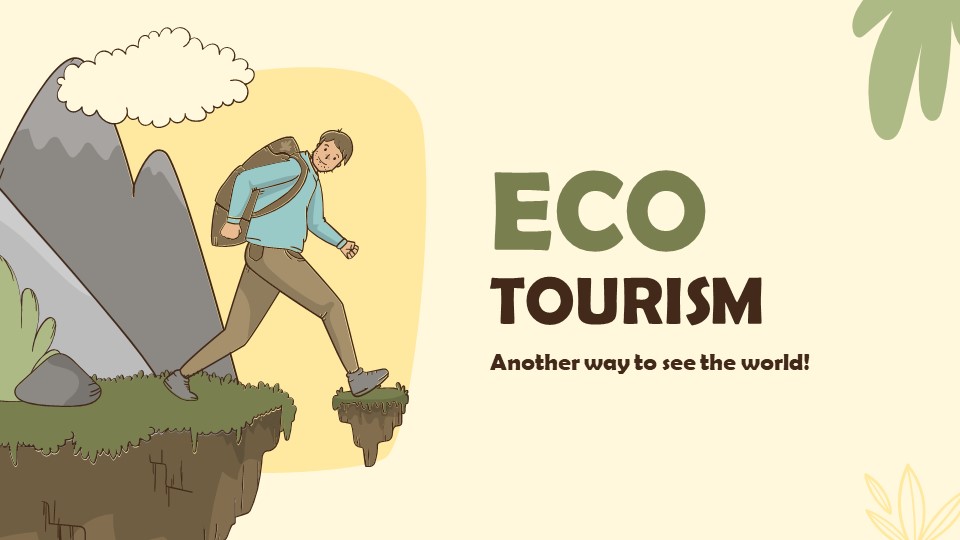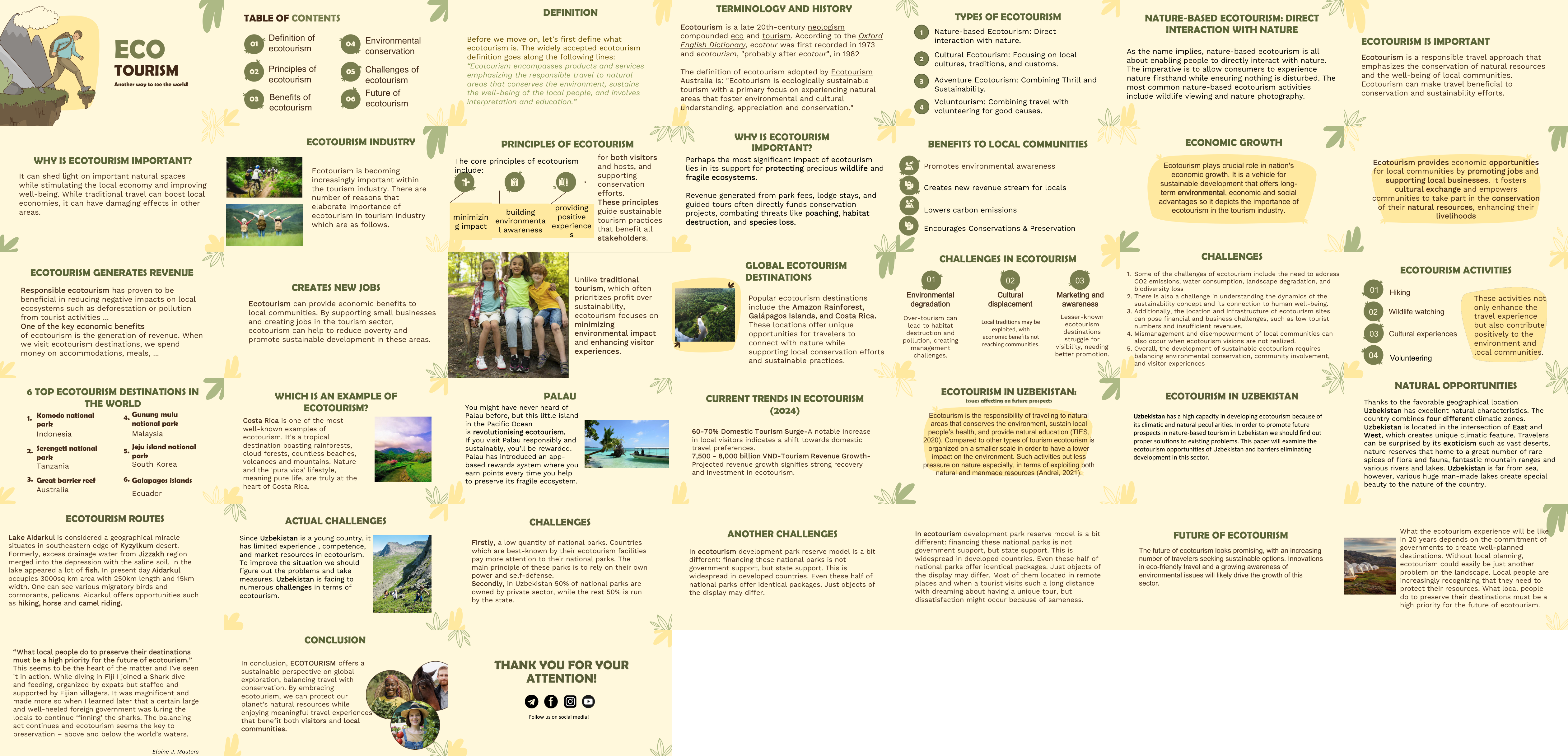
ECO TOURISM
Ecotourism – Another Way to See the World!
Ecotourism (eko-turizm) — bu tabiatga mas’uliyatli sayohat bo‘lib, u atrof-muhitni muhofaza qilish, mahalliy aholini qo‘llab-quvvatlash va sayohatchilarga ekologik ta’lim berishni o‘z ichiga oladi. Bu zamonaviy turizmning eng muhim, barqaror va foydali yo‘nalishlaridan biridir.
1. Ecotourism ta’rifi
Eng ko‘p qabul qilingan ta’rifga ko‘ra, “Ecotourism encompasses responsible travel to natural areas that conserves the environment, sustains the well-being of local people, and involves interpretation and education.”
Ya’ni, ekologik turizm — bu tabiatni asrash, mahalliy aholini qo‘llab-quvvatlash va ekologik ongni rivojlantirishga qaratilgan mas’uliyatli sayohatdir.
2. Ecotourismning asosiy turlari
- Tabiatga asoslangan turizm – tabiat bilan bevosita muloqot, yovvoyi hayvonlarni kuzatish, fotografiya qilish.
- Madaniy ekoturizm – mahalliy xalq urf-odatlari, madaniyatini o‘rganish.
- Sarguzasht ekoturizmi – tabiat qo‘ynida xavfsiz va barqaror sarguzasht sayohatlar.
- Voluntourism – sayohat bilan birga ko‘ngilli ishlarni bajarish, mahalliy jamoaga foyda keltirish.
3. Ecotourismning asosiy tamoyillari
- Atrof-muhitga ta’sirni kamaytirish.
- Ekologik ongni va madaniy qadriyatlarni oshirish.
- Sayyohlar va mahalliy aholi uchun ijobiy tajriba yaratish.
- Tabiatni muhofaza qilish loyihalarini qo‘llab-quvvatlash.
4. Ecotourismning foydalari
Ekoturizm ekologik barqarorlik, iqtisodiy o‘sish va ijtimoiy rivojlanishni birlashtiradi.
- Atrof-muhitni muhofaza qilishga yordam beradi.
- Mahalliy aholiga yangi daromad manbalari yaratadi.
- Uglerod chiqindilarini kamaytiradi.
- Madaniyatlararo almashinuvni rivojlantiradi.
- Ekotizimlarni himoya qilish uchun mablag‘ yaratadi (masalan, milliy bog‘lar uchun to‘lovlar).
5. Ecotourismning iqtisodiy ahamiyati
Ekoturizm davlat iqtisodiyoti uchun ham foydali: u yangi ish o‘rinlarini yaratadi, mahalliy tadbirkorlikni qo‘llaydi, va barqaror turizmni rivojlantiradi.
Misol: Ekoturizm markazlariga tashrif buyuruvchi sayyohlar mehmonxonalar, transport va qo‘llanma xizmatlari orqali mahalliy iqtisodga to‘g‘ridan-to‘g‘ri ta’sir qiladi.
6. Dunyo miqyosidagi ekoturizm yo‘nalishlari
- Amazon o‘rmonlari – Janubiy Amerikada yovvoyi tabiat markazi.
- Galapagos orollari (Ekvador) – noyob hayvonot dunyosi bilan mashhur.
- Kosta-Rika – “pura vida” (“sof hayot”) falsafasiga asoslangan barqaror turizm.
- Buyuk to‘siq riflari (Avstraliya) – dengiz hayoti va riflarni saqlash markazi.
- Komodo milliy bog‘i (Indoneziya) – noyob Komodo ajdarlari yashaydigan orollar.
- Jeju oroli (Janubiy Koreya) – tabiiy go‘zalligi bilan mashhur UNESCO merosi.
7. Ecotourismning global muammolari
- Atrof-muhitning ifloslanishi va ekologik degradatsiya.
- Madaniy qadriyatlarning yo‘qolishi yoki tijoratlashuvi.
- Ortiqcha turizm (overtourism) sababli tabiiy joylarning buzilishi.
- Mahalliy jamoalarga daromadning to‘liq yetib bormasligi.
- Ekoturizm joylarining yetarli reklama qilinmasligi.
Shu bois barqaror ekoturizm siyosatini yaratish — davlatlar uchun ustuvor vazifalardan biridir.
8. Ecotourism in Uzbekistan
O‘zbekiston o‘zining tabiiy va iqlimiy sharoitlari tufayli ekoturizmni rivojlantirishda katta salohiyatga ega. Mamlakatda cho‘l, tog‘, o‘rmon va daryo ekotizimlari mavjud bo‘lib, ular o‘ziga xos biologik xilma-xillikka ega.
Asosiy imkoniyatlar:
- Turli iqlim zonalari — cho‘l, tog‘, dasht va o‘rmonlarning uyg‘unligi.
- Flora va faunaning noyob turlari (Aidarkul, Zaamin, Ugom-Chotqol qo‘riqxonalari).
- Ekoturizm uchun mos infratuzilma va tabiiy go‘zalliklar.
Asosiy muammolar:
- Milliy bog‘lar sonining kamligi.
- Ekoturizmda xususiy sektorning sust ishtiroki.
- Uzoq masofalardagi obyektlarning transport infratuzilmasi yetarli emasligi.
- Ekologik ta’lim va targ‘ibotning pastligi.
9. Ecoturismning kelajagi
Ekoturizmning kelajagi istiqbolli. Tabiatni asrash, mahalliy jamoalarni qo‘llab-quvvatlash va barqaror sayohatga bo‘lgan talab yildan-yilga ortib bormoqda.
Kelajakda muvaffaqiyatli ekoturizm uchun asosiy omil — mahalliy aholini faol jalb etish va tabiatni muhofaza qilishga sodiqlik bo‘ladi.
Xulosa
Ecotourism — bu nafaqat sayohat qilish usuli, balki tabiatni saqlash, mahalliy aholiga yordam berish va ekologik ongni rivojlantirish madaniyatidir. Ekoturizm orqali insoniyat o‘z sayohatidan nafaqat zavq oladi, balki sayyoramiz kelajagiga ijobiy ta’sir ko‘rsatadi.
=== Taqdimot 1 ===
ECO TOURISM
Another way to see the world!
=== Taqdimot 2 ===
Definition of ecotourism
TABLE OF CONTENTS
06
03
Environmental conservation
02
Principles of ecotourism
05
Challenges of ecotourism
01
04
Benefits of ecotourism
Future of ecotourism
=== Taqdimot 3 ===
Before we move on, let’s first define what ecotourism is. The widely accepted ecotourism definition goes along the following lines:
“Ecotourism encompasses products and services emphasizing the responsible travel to natural areas that conserves the environment, sustains the well-being of the local people, and involves interpretation and education.”
DEFINITION
=== Taqdimot 4 ===
Ecotourism is a late 20th-century neologism
compounded eco and tourism. According to the Oxford English Dictionary, ecotour was first recorded in 1973 and ecotourism, «probably after ecotour», in 1982
The definition of ecotourism adopted by Ecotourism Australia is: «Ecotourism is ecologically sustainable tourism with a primary focus on experiencing natural areas that foster environmental and cultural understanding, appreciation and conservation.»
TERMINOLOGY AND HISTORY
=== Taqdimot 5 ===
TYPES OF ECOTOURISM
1
2
3
4
Nature-based Ecotourism: Direct interaction with nature.
Cultural Ecotourism: Focusing on local cultures, traditions, and customs.
Adventure Ecotourism: Combining Thrill and Sustainability.
Voluntourism: Combining travel with volunteering for good causes.
=== Taqdimot 6 ===
NATURE-BASED ECOTOURISM: DIRECT INTERACTION WITH NATURE
As the name implies, nature-based ecotourism is all about enabling people to directly interact with nature. The imperative is to allow consumers to experience nature firsthand while ensuring nothing is disturbed. The most common nature-based ecotourism activities include wildlife viewing and nature photography.
=== Taqdimot 7 ===
ECOTOURISM IS IMPORTANT
Ecotourism is a responsible travel approach that emphasizes the conservation of natural resources and the well-being of local communities.
Ecotourism can make travel beneficial to conservation and sustainability efforts.
=== Taqdimot 8 ===
It can shed light on important natural spaces while stimulating the local economy and improving well-being. While traditional travel can boost local economies, it can have damaging effects in other areas.
WHY IS ECOTOURISM IMPORTANT?
=== Taqdimot 9 ===
Ecotourism is becoming increasingly important within the tourism industry. There are number of reasons that elaborate importance of ecotourism in tourism industry which are as follows.
ECOTOURISM INDUSTRY
=== Taqdimot 10 ===
minimizing impact
building environmental awareness
providing positive experiences
PRINCIPLES OF ECOTOURISM
for both visitors and hosts, and supporting conservation efforts.
These principles guide sustainable tourism practices that benefit all stakeholders.
The core principles of ecotourism include:
=== Taqdimot 11 ===
WHY IS ECOTOURISM IMPORTANT?
Perhaps the most significant impact of ecotourism lies in its support for protecting precious wildlife and fragile ecosystems.
Revenue generated from park fees, lodge stays, and guided tours often directly funds conservation projects, combating threats like poaching, habitat destruction, and species loss.
=== Taqdimot 12 ===
BENEFITS TO LOCAL COMMUNITIES
Promotes environmental awareness
Creates new revenue stream for locals
Lowers carbon emissions
Encourages Conservations & Preservation
=== Taqdimot 13 ===
Ecotourism plays crucial role in nation’s economic growth. It is a vehicle for sustainable development that offers long-term environmental, economic and social advantages so it depicts the importance of ecotourism in the tourism industry.
ECONOMIC GROWTH
=== Taqdimot 14 ===
Ecotourism provides economic opportunities for local communities by promoting jobs and supporting local businesses. It fosters cultural exchange and empowers communities to take part in the conservation of their natural resources, enhancing their livelihoods
=== Taqdimot 15 ===
Responsible ecotourism has proven to be beneficial in reducing negative impacts on local ecosystems such as deforestation or pollution from tourist activities …
One of the key economic benefits of ecotourism is the generation of revenue. When we visit ecotourism destinations, we spend money on accommodations, meals, …
ECOTOURISM GENERATES REVENUE
=== Taqdimot 16 ===
Ecotourism can provide economic benefits to local communities. By supporting small businesses and creating jobs in the tourism sector, ecotourism can help to reduce poverty and promote sustainable development in these areas.
CREATES NEW JOBS
=== Taqdimot 17 ===
Unlike traditional tourism, which often prioritizes profit over sustainability, ecotourism focuses on minimizing environmental impact and enhancing visitor experiences.
=== Taqdimot 18 ===
GLOBAL ECOTOURISM DESTINATIONS
Popular ecotourism destinations include the Amazon Rainforest, Galápagos Islands, and Costa Rica. These locations offer unique opportunities for travelers to connect with nature while supporting local conservation efforts and sustainable practices.
=== Taqdimot 19 ===
Environmental degradation
Cultural displacement
Over-tourism can lead to habitat destruction and pollution, creating management challenges.
Marketing and awareness
01
02
03
Local traditions may be exploited, with economic benefits not reaching communities.
Lesser-known ecotourism destinations struggle for visibility, needing better promotion.
CHALLENGES IN ECOTOURISM
=== Taqdimot 20 ===
Some of the challenges of ecotourism include the need to address CO2 emissions, water consumption, landscape degradation, and biodiversity loss
There is also a challenge in understanding the dynamics of the sustainability concept and its connection to human well-being.
Additionally, the location and infrastructure of ecotourism sites can pose financial and business challenges, such as low tourist numbers and insufficient revenues.
Mismanagement and disempowerment of local communities can also occur when ecotourism visions are not realized.
Overall, the development of sustainable ecotourism requires balancing environmental conservation, community involvement, and visitor experiences
CHALLENGES
=== Taqdimot 21 ===
Hiking
Wildlife watching
Cultural experiences
01
02
03
ECOTOURISM ACTIVITIES
04
Volunteering
These activities not only enhance the travel experience but also contribute positively to the environment and local communities.
=== Taqdimot 22 ===
1.
Komodo national park
Indonesia
3.
Great barrier reef
Australia
4.
Gunung mulu national park
Malaysia
6 TOP ECOTOURISM DESTINATIONS IN THE WORLD
6.
Galapagos islands
Ecuador
2.
Serengeti national park
Tanzania
5.
Jeju island national park
South Korea
=== Taqdimot 23 ===
Costa Rica is one of the most well-known examples of ecotourism. It’s a tropical destination boasting rainforests, cloud forests, countless beaches, volcanoes and mountains. Nature and the ‘pura vida’ lifestyle, meaning pure life, are truly at the heart of Costa Rica.
WHICH IS AN EXAMPLE OF ECOTOURISM?
=== Taqdimot 24 ===
PALAU
You might have never heard of Palau before, but this little island in the Pacific Ocean is revolutionising ecotourism.
If you visit Palau responsibly and sustainably, you’ll be rewarded. Palau has introduced an app-based rewards system where you earn points every time you help to preserve its fragile ecosystem.
=== Taqdimot 25 ===
60-70% Domestic Tourism Surge-A notable increase in local visitors indicates a shift towards domestic travel preferences.
7,500 – 8,000 billion VND-Tourism Revenue Growth-Projected revenue growth signifies strong recovery and investment in ecotourism.
CURRENT TRENDS IN ECOTOURISM (2024)
=== Taqdimot 26 ===
Ecotourism is the responsibility of traveling to natural areas that conserves the environment, sustain local people’s health, and provide natural education (TIES, 2020). Compared to other types of tourism ecotourism is organized on a smaller scale in order to have a lower impact on the environment. Such activities put less pressure on nature especially, in terms of exploiting both natural and manmade resources (Andrei, 2021).
ECOTOURISM IN UZBEKISTAN:
issues affecting on future prospects
=== Taqdimot 27 ===
ECOTOURISM IN UZBEKISTAN
Uzbekistan has a high capacity in developing ecotourism because of its climatic and natural peculiarities. In order to promote future prospects in nature-based tourism in Uzbekistan we should find out proper solutions to existing problems. This paper will examine the ecotourism opportunities of Uzbekistan and barriers eliminating development in this sector.
=== Taqdimot 28 ===
NATURAL OPPORTUNITIES
Thanks to the favorable geographical location Uzbekistan has excellent natural characteristics. The country combines four different climatic zones. Uzbekistan is located in the intersection of East and West, which creates unique climatic feature. Travelers can be surprised by its exoticism such as vast deserts, nature reserves that home to a great number of rare spices of flora and fauna, fantastic mountain ranges and various rivers and lakes. Uzbekistan is far from sea, however, various huge man-made lakes create special beauty to the nature of the country.
=== Taqdimot 29 ===
Lake Aidarkul is considered a geographical miracle situates in southeastern edge of Kyzylkum desert. Formerly, excess drainage water from Jizzakh region merged into the depression with the saline soil. In the lake appeared a lot of fish. In present day Aidarkul occupies 3000sq km area with 250km length and 15km width. One can see various migratory birds and cormorants, pelicans. Aidarkul offers opportunities such as hiking, horse and camel riding.
ECOTOURISM ROUTES
=== Taqdimot 30 ===
ACTUAL CHALLENGES
Since Uzbekistan is a young country, it has limited experience , competence, and market resources in ecotourism. To improve the situation we should figure out the problems and take measures. Uzbekistan is facing to numerous challenges in terms of ecotourism.
=== Taqdimot 31 ===
Firstly, a low quantity of national parks. Countries which are best-known by their ecotourism facilities pay more attention to their national parks. The main principle of these parks is to rely on their own power and self-defense.
Secondly, in Uzbekistan 50% of national parks are owned by private sector, while the rest 50% is run by the state.
CHALLENGES
=== Taqdimot 32 ===
ANOTHER CHALLENGES
In ecotourism development park reserve model is a bit different: financing these national parks is not government support, but state support. This is widespread in developed countries. Even these half of national parks offer identical packages. Just objects of the display may differ.
=== Taqdimot 33 ===
In ecotourism development park reserve model is a bit different: financing these national parks is not government support, but state support. This is widespread in developed countries. Even these half of national parks offer identical packages. Just objects of the display may differ. Most of them located in remote places and when a tourist visits such a long distance with dreaming about having a unique tour, but dissatisfaction might occur because of sameness.
=== Taqdimot 34 ===
FUTURE OF ECOTOURISM
The future of ecotourism looks promising, with an increasing number of travelers seeking sustainable options. Innovations in eco-friendly travel and a growing awareness of environmental issues will likely drive the growth of this sector.
=== Taqdimot 35 ===
What the ecotourism experience will be like in 20 years depends on the commitment of governments to create well-planned destinations. Without local planning, ecotourism could easily be just another problem on the landscape. Local people are increasingly recognizing that they need to protect their resources. What local people do to preserve their destinations must be a high priority for the future of ecotourism.
=== Taqdimot 36 ===
“What local people do to preserve their destinations must be a high priority for the future of ecotourism.” This seems to be the heart of the matter and I’ve seen it in action. While diving in Fiji I joined a Shark dive and feeding, organized by expats but staffed and supported by Fijian villagers. It was magnificent and made more so when I learned later that a certain large and well-heeled foreign government was luring the locals to continue ‘finning’ the sharks. The balancing act continues and ecotourism seems the key to preservation – above and below the world’s waters.
Elaine J. Masters
=== Taqdimot 37 ===
In conclusion, ECOTOURISM offers a sustainable perspective on global exploration, balancing travel with conservation. By embracing ecotourism, we can protect our planet’s natural resources while enjoying meaningful travel experiences that benefit both visitors and local communities.
CONCLUSION
=== Taqdimot 38 ===
THANK YOU FOR YOUR ATTENTION!
Follow us on social media!
🌿 “Ecotourism – Another Way to See the World!” taqdimotini Slaydchi.uz saytida tomosha qiling.
Slaydchi.uz — ekologik turizm, geografiya va barqaror rivojlanish bo‘yicha taqdimotlar platformasi.
Boshqa turizm mavzulari uchun: slaydchi.uz
| 5 |
|
0 |
| 4 |
|
0 |
| 3 |
|
0 |
| 2 |
|
0 |
| 1 |
|
0 |




























Sharhlar
Hali sharhlar mavjud emas.